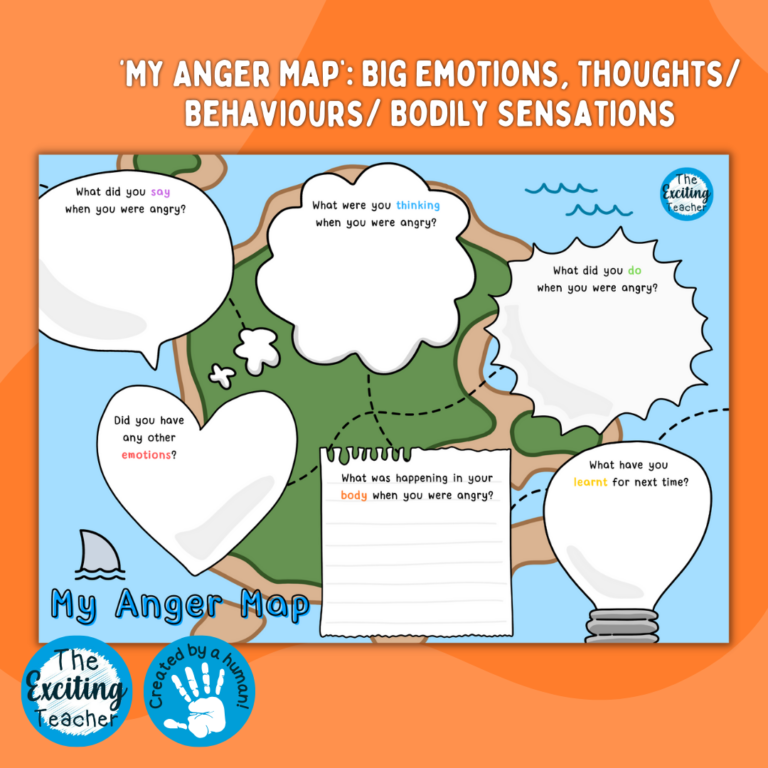'The Overflowing Bucket': Understanding the Stress Response and Feeling Overwhelmed

Are you looking for ways to help your child manage their stress and overwhelm symptoms? Look no further than the Overflowing Bucket!
This resource helps children to recognise what makes them feel overwhelmed and like their bucket is overflowing!
It prompts children to consider their triggers of stress, things they can do to overcome and reduce their stress feelings and preventative measures they can take in the future!
This resource is also the perfect therapy resource for EMHPs, CWPs, and ELSAs to use in their 1:1 sessions.
Relevant Curriculum Links
England PSHE Statutory Curriculum Strands:
KS1:
- H11. about different feelings that humans can experience.
- H12. how to recognise and name different feelings.
- H13. how feelings can affect people’s bodies and how they behave.
- H16. about ways of sharing feelings; a range of words to describe feelings.
- H17. about things that help people feel good (e.g. playing outside, doing things they enjoy, spending time with family, getting enough sleep).
- H18. different things they can do to manage big feelings, to help calm themselves down and/or change their mood when they don’t feel good.
- H19. to recognise when they need help with feelings; that it is important to ask for help with feelings; and how to ask for it.
KS2:
- H15. that mental health, just like physical health, is part of daily life; the importance of taking care of mental health.
- H17. to recognise that feelings can change over time and range in intensity.
- H18. about everyday things that affect feelings and the importance of expressing feelings.
- H19. a varied vocabulary to use when talking about feelings; about how to express feelings in different ways.
- H20. strategies to respond to feelings, including intense or conflicting feelings; how to manage and respond to feelings appropriately and proportionately in different situations.
- H21. to recognise warning signs about mental health and wellbeing and how to seek support for themselves and others.
- H24. problem-solving strategies for dealing with emotions, challenges and change, including the transition to new schools.
Scottish Health and Wellbeing Curriculum Outcome(s):
- I am aware of and able to express my feelings and am developing the ability to talk about them. HWB 0-01a / HWB 1-01a / HWB 2-01a / HWB 3-01a / HWB 4-01a.
- I know that we all experience a variety of thoughts and emotions that affect how we feel and behave and I am learning ways of managing them. HWB 0-02a / HWB 1-02a / HWB 2-02a / HWB 3-02a / HWB 4-02a.
- I understand that there are people I can talk to and that there are a number of ways in which I can gain access to practical and emotional support to help me and others in a range of circumstances. HWB 0-03a / HWB 1-03a / HWB 2-03a / HWB 3-03a / HWB 4-03a.
- I understand that my feelings and reactions can change depending upon what is happening within and around me. This helps me to understand my own behaviour and the way others behave. HWB 0-04a / HWB 1-04a / HWB 2-04a / HWB 3-04a / HWB 4-04a.
- I understand the importance of mental wellbeing and that this can be fostered and strengthened through personal coping skills and positive relationships. I know that it is not always possible to enjoy good mental health and that if this happens there is support available. HWB 0-06a / HWB 1-06a / HWB 2-06a / HWB 3-06a / HWB 4-06a.
Share the Love:
Facebook
Twitter
Pinterest
WhatsApp
Email
Print
Threads
Request a Resource:
Tagged Emotional Literacy, Emotional Regulation, Essential, HWB 0-01a / HWB 1-01a / HWB 2-01a / HWB 3-01a / HWB 4-01a, HWB 0-02a / HWB 1-02a / HWB 2-02a / HWB 3-02a / HWB 4-02a, HWB 0-03a / HWB 1-03a / HWB 2-03a / HWB 3-03a / HWB 4-03a, HWB 0-04a / HWB 1-04a / HWB 2-04a / HWB 3-04a / HWB 4-04a, HWB 0-06a / HWB 1-06a / HWB 2-06a / HWB 3-06a / HWB 4-06a, KS1, KS1H11, KS1H12, KS1H13, KS1H16, KS1H17, KS1H18, KS1H19, KS2, KS2H15, KS2H17, KS2H18, KS2H19, KS2H20, KS2H21, KS2H24, Plus, SEND



